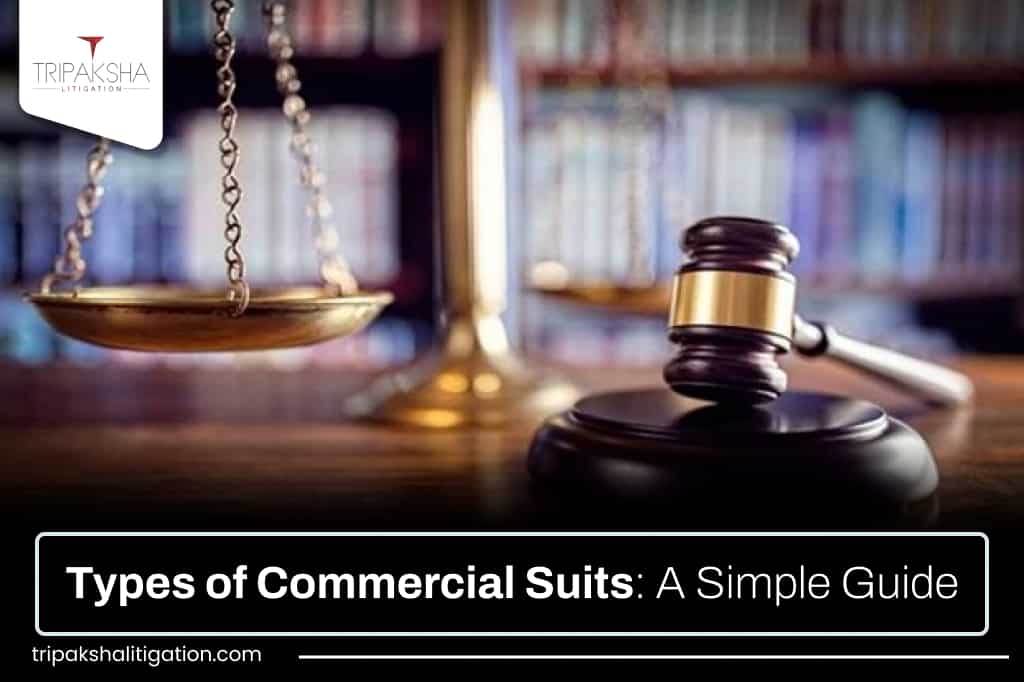Commercial suits are legal cases that come up in the world of business. These cases are important because they help resolve disputes, protect business interests, and ensure fair practices. Knowing the different types of commercial suits can help businesses, lawyers, and anyone involved in commerce understand what to expect and how to handle these situations. Here’s a straightforward look at the main types of commercial suits.
What is Breach of Contract
A breach of contract happens when one party doesn’t do what they promised in a contract. This type of suit aims to either enforce the contract or get compensation for losses caused by the breach.
Key Points
- Valid contract: There must be a real agreement in place.
- Breach: One party didn’t follow the agreement.
- Losses: The other party suffered because of the breach.
Examples
- Not delivering goods or services on time.
- Not paying for goods or services received.
- Breaking specific terms like confidentiality.
What is Partnership Disputes
Partnership disputes occur when business partners disagree on issues like management, profits, or dissolving the partnership.
Key Points
- Partnership agreement: The terms of the partnership are usually in a written agreement.
- Dispute type: This can include financial disagreements or operational issues.
- Resolution: Many agreements include ways to resolve disputes.
Examples
- Disagreements over profit sharing.
- Conflicts about business decisions.
- Issues with adding or removing partners.
What is Intellectual Property (IP) Infringement
IP infringement suits happen when someone uses another’s intellectual property (like patents, trademarks, or copyrights) without permission.
Key Points
- IP ownership: The plaintiff must prove they own the IP.
- Infringement: Unauthorized use of the IP.
- Harm: The owner suffered or could suffer damage.
Examples
- Using patented technology without permission.
- Copying a trademarked logo.
- Distributing copyrighted material illegally.
What is Fraud and Misrepresentation
These suits deal with situations where one party deceives another, causing financial or other losses.
Key Points
- False statement: The defendant made a false claim.
- Knowledge: The defendant knew the statement was false.
- Reliance: The plaintiff believed the false claim.
- Damage: The plaintiff suffered losses.
Examples
- Lying about a company’s financial status in a sale.
- Providing false information on loan applications.
- Tricking someone into signing a contract.
What is Employment Disputes
Employment disputes arise from issues between employers and employees, like wrongful termination or discrimination.
Key Points
- Employment agreement: The terms of employment, written or implied.
- Dispute type: Wrongful dismissal, harassment, discrimination, or wage issues.
- Legal protections: Employment laws often guide these disputes.
Examples
- Firing an employee without a valid reason.
- Discrimination based on race, gender, or other factors.
- Disputes over unpaid wages or benefits.
What is Shareholder Disputes
Shareholder disputes happen between shareholders of a company, often about management, control, or financial issues.
Key Points
- Shareholder rights: Based on corporate bylaws or shareholder agreements.
- Dispute type: Financial mismanagement or share dilution.
- Legal actions: Shareholders can seek injunctions or monetary damages.
Examples
- Disputes over dividend payments.
- Claims of mismanagement by directors.
- Conflicts during mergers or acquisitions.
What is Antitrust and Competition Disputes
These disputes involve allegations of anti-competitive practices, like monopolies, price-fixing, or unfair trade.
Key Points
- Anti-competitive actions: Practices that reduce competition.
- Market impact: Harm to the competitive environment or consumers.
- Legal standards: Based on antitrust laws.
Examples
- Companies agreeing to fix prices.
- Dominating the market to block competitors.
- Unfair practices to eliminate competition.
Conclusion
Commercial suits are essential for resolving business disputes and ensuring fair practices. By understanding these types, businesses and legal professionals can better handle conflicts and protect their interests. Whether dealing with contract breaches, partnership issues, IP theft, or unfair competition, knowing the basics of commercial suits helps in managing and resolving these legal challenges effectively.

